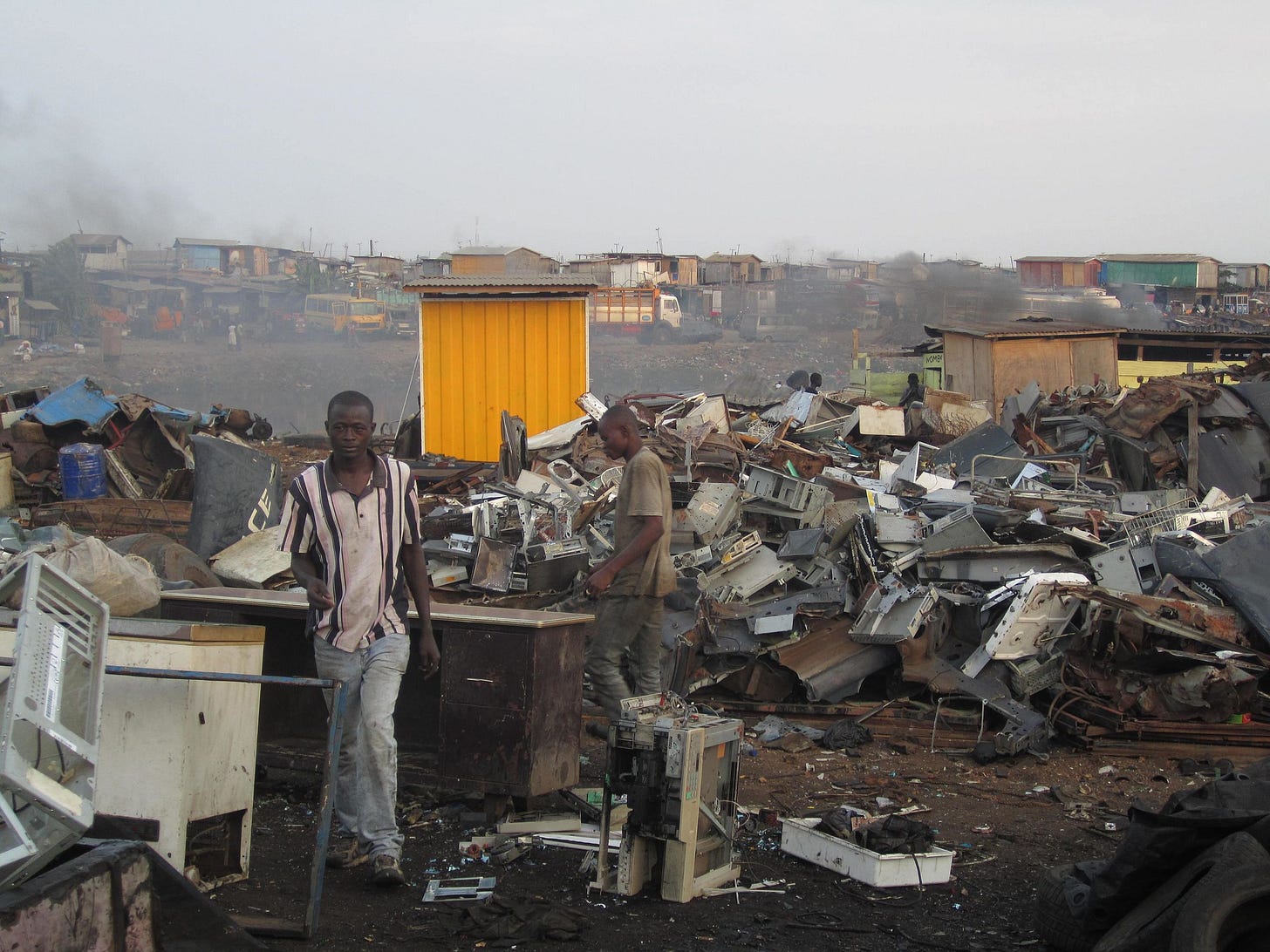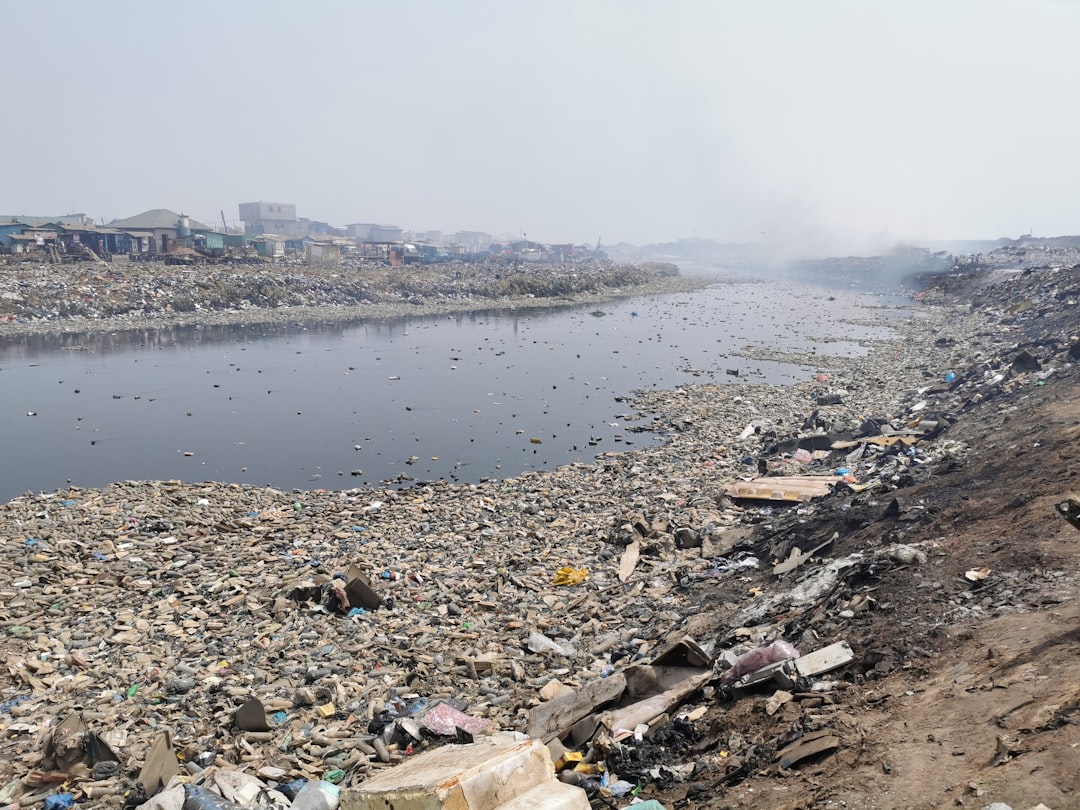The Mayor of Sodom and Gomorrah
The true story of when I met the mafia kingpin of Ghana's most infamous slum... and why we talked about Bitcoin.

This week’s essay is a bit different. A memory from 2016 in one of the world’s most fascinating neighborhoods.
There’s no denying its seedy side, but “Sodom and Gomorrah” has a liveliness that many American neighborhoods lack. It’s a frontier, with the hope and the hardship and the thrill of being just-on-the-edge-of-something that defines all dynamic places.
Enjoy.
I met the Mayor of Sodom and Gomorrah on a warm afternoon in 2016. The neighborhood stretched through a labyrinth of dirt streets and damp alleyways framed by the space between plywood shacks. A chicken flapped by. I was immediately lost.
Old Fadama squats in a lagoon-turned-electronics-landfill in Accra, Ghana. Recyclers comb the fields of smoldering waste. But, like everywhere else, workers want to live near their jobs. So a town grew around the dump. It’s not pretty, but Old Fadama has product-market fit: over 40,000 people migrated to make it their home.
Christian residents of Accra gave Old Fadama the inauspicious Biblical name of "Sodom and Gomorrah" because, well... use your imagination. As I walked the streets, women leaned out of windows to shout “obroni!” — slang for "white guy." Sodom and Gomorrah supports a variety of professions, including humanity’s oldest.
I crossed an alley and entered what I can only describe as a drug den. I pushed aside a blue tarp. A pungent cloud billowed. Men without shirts were sprawled everywhere in, ahem, “expansive” states of consciousness.
I stumbled through a hole in the wall back to the street. A man straddling a motorbike stared at me. It was clear he knew why I was there. And it was clear he was following me.
I was glad to be walking with Reggie, my local fixer. Reggie was a brilliant former telecom executive and stood about 6' 6'' with a build like a linebacker. He’d set up today’s meeting with Achiri, the “Mayor” of Sodom and Gomorrah.
“Achiri is a very bad boy,” Reggie warned, “But he solves the problems, so he’s in charge.”
I was in Sodom and Gomorrah to interview with a swashbuckling Bitcoin startup. The company (and its big-name Silicon Valley backers) wanted to offer saving plans based in Bitcoin, a way to skirt dumb rules that exclude many of the world’s poorest people from traditional bank accounts. The corner shops that dot the dense, free-wheeling urbanism of Sodom and Gomorrah were the perfect distribution network for a decentralized bank.
But no business gets done in Sodom and Gomorrah without “Mayor” Achiri’s blessing.

We reached the Mayor's office. It stood on a busy central street, no doubt so Achiri could easily see who came and went. Bare wooden posts held a roof of corrugated metal. Layers of palettes raised the floor from the dirt beneath. Tarps formed walls on three sides and the missing wall was the entryway.
The missing wall and raised floor made a viewing window to Achiri's throne: a plastic lawn chair.
Achiri sat on the lawn chair throne. Two henchmen in tanktops stood on his flanks. Others scowled near motorbikes outside. Reggie and I unfolded chairs and sat down.
I shook Achiri’s hand. I thanked him for his time. He sat in silence, expressionless.
Desperate to relieve some tension, I smiled. He did not smile back.
Achiri leaned forward in his chair. He looked me straight in the eye. One of his eyes was piercing white and brown, the other a milky red and cut by a deep, old scar — like that made by the edge of a machete.
Some ancient voice in my head said, “Don’t blink! Do not blink!”
The stare dragged on. I sat there in my blue startup t-shirt, holding a little company notebook like some hapless minor character from an episode of Silicon Valley. My brain went existential: “What in the hell am I doing right now?” I tried to hide my growing panic by… doubling down on the awkward smile?
The tension broke. Suddenly, Achiri became a warm and gracious host. Whatever he was looking for — was it honesty? Fear? — he was satisfied. We admired photos of his friends and family. We talked about sports, where I managed to make myself look even more ridiculous by knowing nothing about soccer—I mean football. Silly obroni.
We got down to business. Achiri and his henchmen needed to renew a guarantee of safety for the bank employees that collected the savings of residents. Agents in startup t-shirts hauling bags of cash are easy targets — an armored car without the armor or the car.
We talked about Bitcoin, and about a bank’s benefits to the neighborhood.
Achiri listened, considered.
He waved his hand with finality. "It is done," he said.
And I had no doubt that his word was good.
Thanks for reading and don’t forget: Startups should build cities!
